Hyderabad, India — The International Rice Research Institute (IRRI), in partnership with the Indian Council of Agricultural Research–Indian Institute of Rice Research (ICAR-IIRR), launched a five-day national training course on genomic predictions and data-driven crop breeding on 24–28 November 2025 in Hyderabad.
India Hosts Advanced Training on Genomic Predictions to Boost Rice Breeding
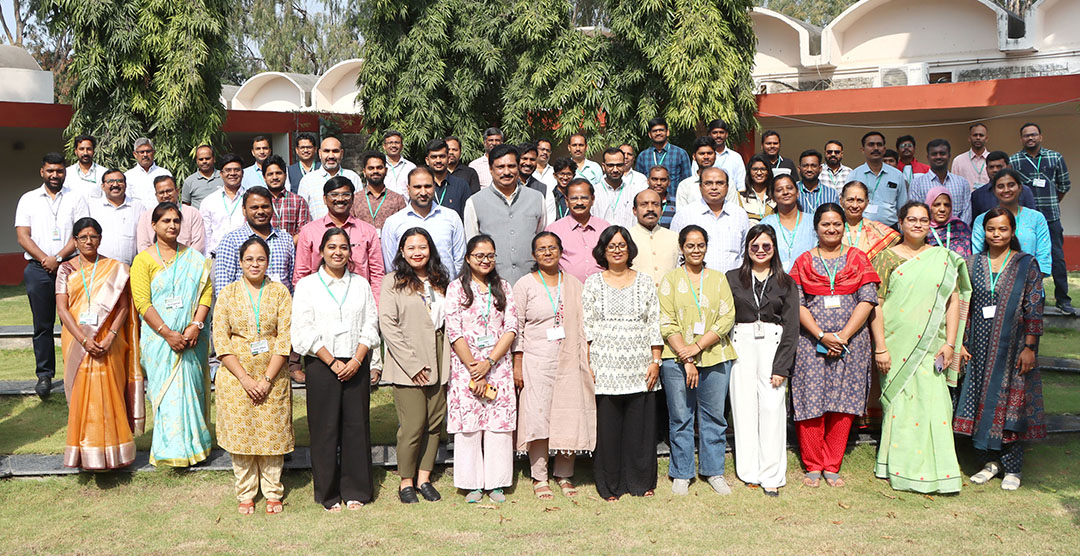
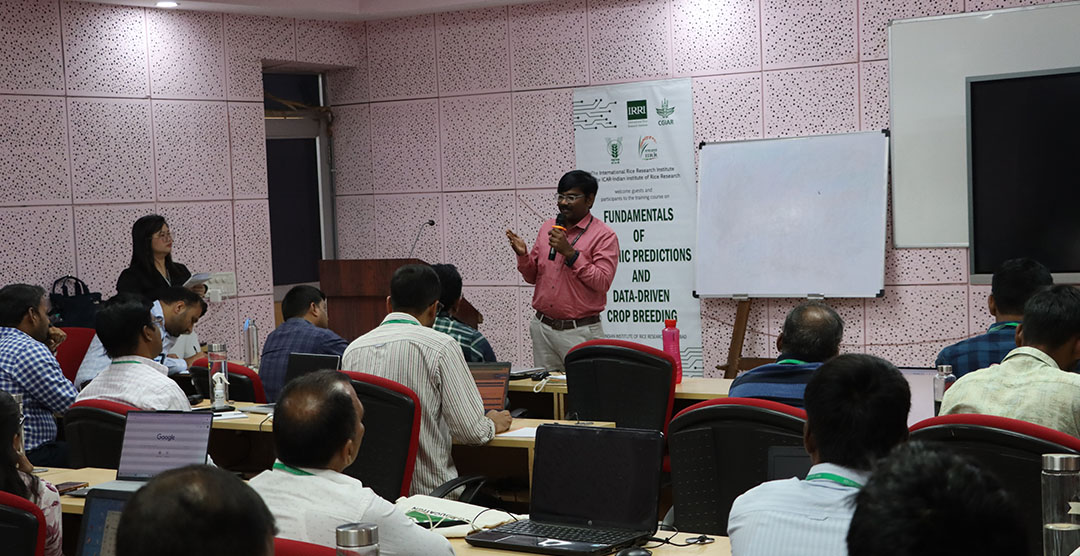
The training brings together 37 plant breeders, geneticists, research scholars, and early-career scientists from across the country to strengthen their skills in modern genomic tools essential for rice improvement. The program combines lectures and hands-on sessions covering quantitative genetics, statistical genomics, predictive modeling, and genomic selection. Participants are working with actual breeding datasets to learn R programming, mixed models, relationship matrices, G × E interaction analysis, and genomic prediction methodologies.
During the opening ceremony, ICAR-IIRR Director Dr. Raman Meenakshi Sundaram emphasized the importance of genomic innovations in building resilient and productive cropping systems. He highlighted the need for open-access data, collaborative research, and continuous capacity development to advance national food security objectives.
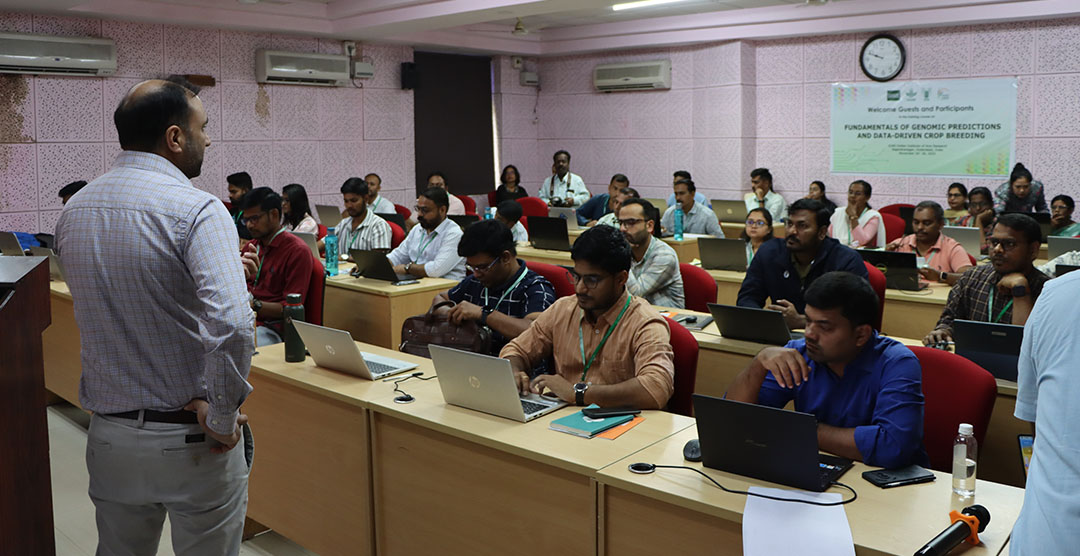
The course is led by IRRI Rice Breeding Innovation (RBI) scientists Dr. Waseem Hussain, Dr. Mahender Anumalla, and Ms. Margaret Ciar, who are guiding participants in applying genomic selection and predictive breeding tools in real-world breeding pipelines.
IRRI Senior Scientist and Regional Breeding Lead–South Asia Dr. Vikas Kumar Singh said the training reinforces the critical role of integrating genomic information with data-driven decision-making. He noted that the program equips India’s next generation of breeders to fast-track varietal development and supports IRRI’s ongoing commitment to strengthening national breeding capacity.
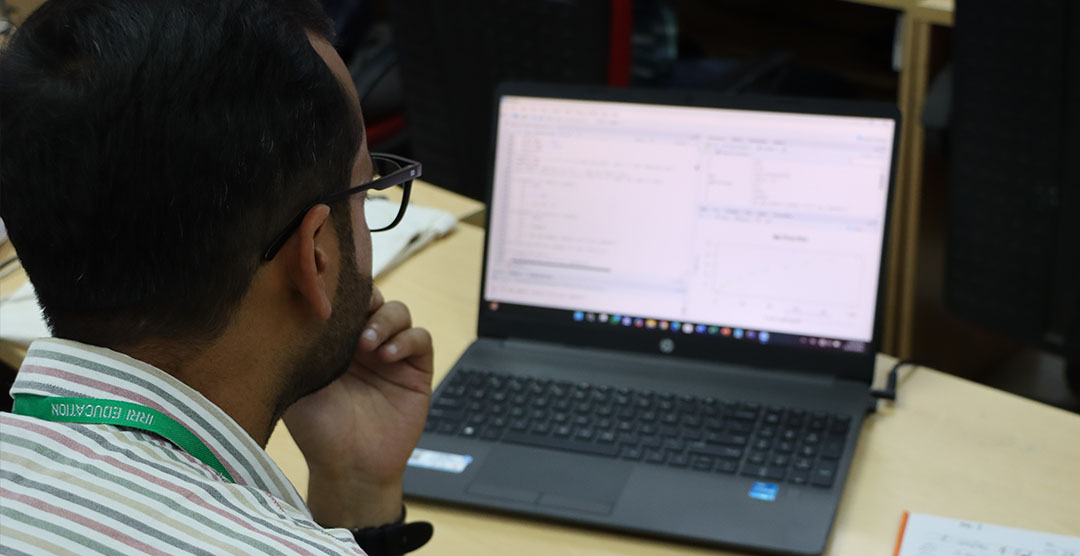
This year’s edition builds on earlier runs of the course first launched at IRRI Headquarters in the Philippines in 2024 and replicated at ICAR-IIRR the same year. The program has since attracted participants from Asia and Africa and is regarded as one of IRRI’s most impactful capacity development initiatives.
Participants are expected to apply genomic prediction, data-driven breeding, and optimized crossing strategies in their institutional programs following the training, contributing to India’s efforts to advance agricultural innovation and sustainability.
Interested in similar training opportunities? Visit education.irri.org to learn more or email us at irri-education@cgiar.org.
ISARC Hosts National Training on GHG Measurement to Advance Climate-Smart Rice Systems
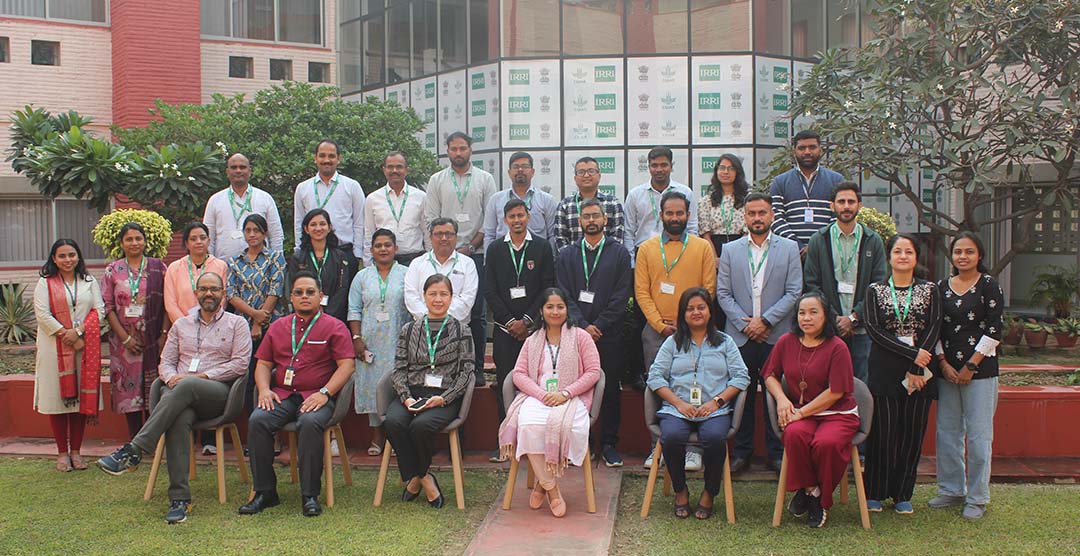
Varanasi, India — The International Rice Research Institute (IRRI) launched a five-day national training program on greenhouse gas (GHG) emissions in rice-based systems at its South Asia Regional Centre (ISARC) in Varanasi on 17–21 November 2025. The program aims to strengthen national capacity in accurately measuring methane emissions and identifying climate-smart mitigation strategies for rice cultivation.
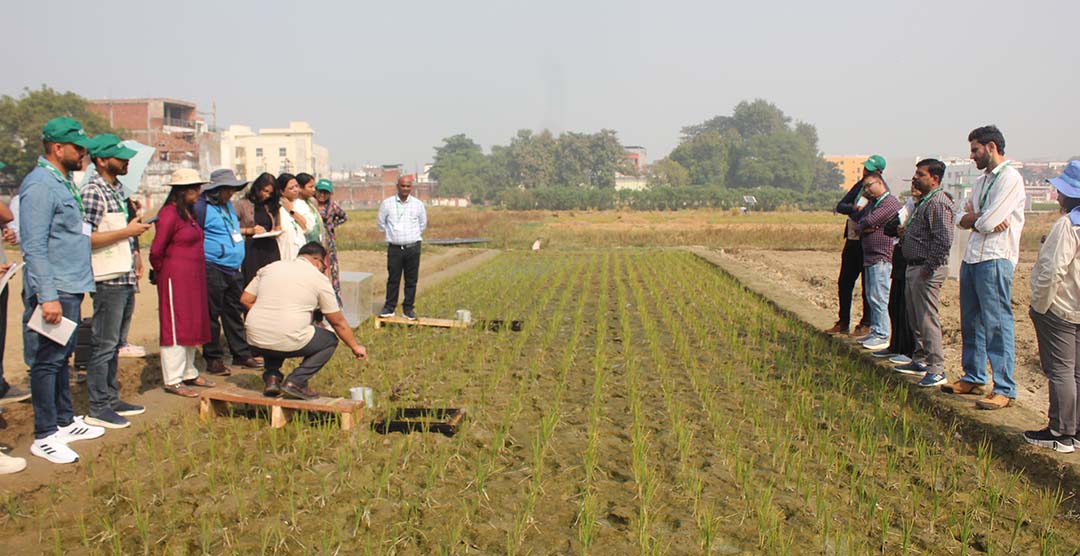
Rice fields in South and Southeast Asia account for more than half of total national methane emissions, making precise monitoring essential for achieving climate targets. The training, “Greenhouse Gas Emissions in Rice Systems: Procedures and Measurement Standards,” equips participants with practical skills in field gas sampling, laboratory analysis, data evaluation, and emission calculations.
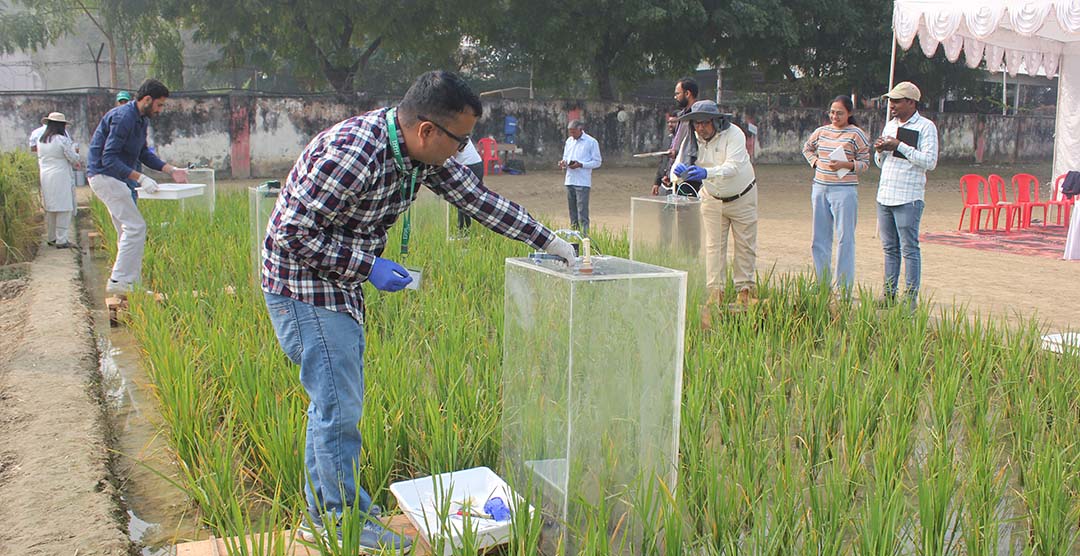
The course covers key learning areas including climate change impacts on rice production, mechanisms of GHG emissions in rice systems, IPCC-aligned inventory methods, alternate wetting and drying (AWD) mitigation practices, field setup and sampling protocols, laboratory analysis procedures, and country-specific case studies. Hands-on sessions guide participants through step-by-step measurement and reporting processes based on IRRI’s established research methodologies.
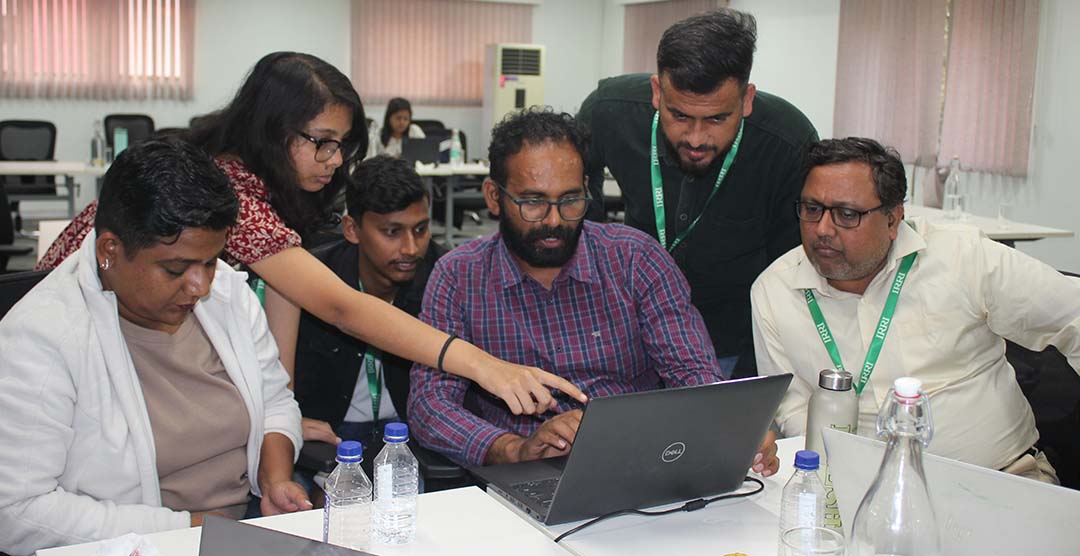
Participants represent a broad mix of public and private institutions, non-governmental organizations, and NARES partners. Institutions include the Indian Institute of Rice Research (IIRR), Kerala Agricultural University, Chaudhary Sarwan Kumar Himachal Pradesh Agricultural University, Punjab Agricultural University, Rallis India Limited, Eco Agripreneurs Pvt. Ltd., The Nature Conservancy, and RestoreEarth Solutions.
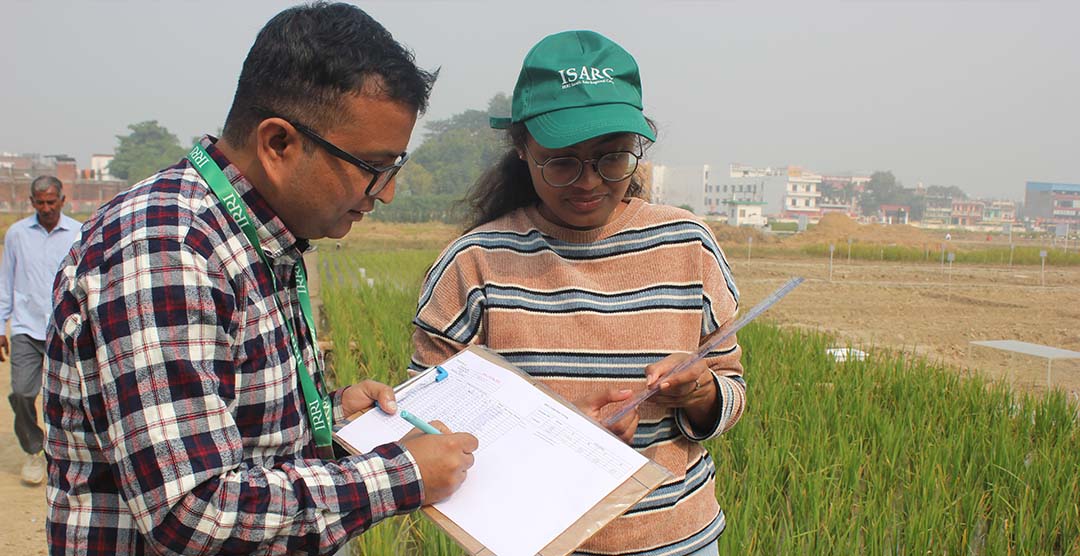
The training opened on 17 November with remarks from Dr. Anilyn D. Mannings, Head of IRRI Education, who welcomed participants, and Dr. Anthony Fulford, Soil Scientist, who addressed attendees on behalf of ISARC. Dr. Ando Radanielson, Senior Scientist and Environment and Climate Change Specialist, presented the course framework.
ISARC Director Dr. Sudhanshu Singh underscored the significance of evidence-based strategies for reducing GHG emissions in rice systems. “South Asia must lead with scientific approaches that reduce emissions while maintaining productivity. This program is a timely and impactful initiative in that direction,” he said.
IRRI Research Director Dr. Virendra Kumar, who inaugurated the program, emphasized the importance of building a collaborative community of scientists, researchers, and policymakers capable of accelerating climate action through rice-based systems.
Dr. Pratap Bhattacharya, Head of the Crop Production Division, ICAR–Central Rice Research Institute, highlighted the global importance of accurate GHG monitoring. “Scientific precision in GHG measurements is essential for shaping effective agricultural policies and mitigation strategies, not only for India but worldwide,” he stated.
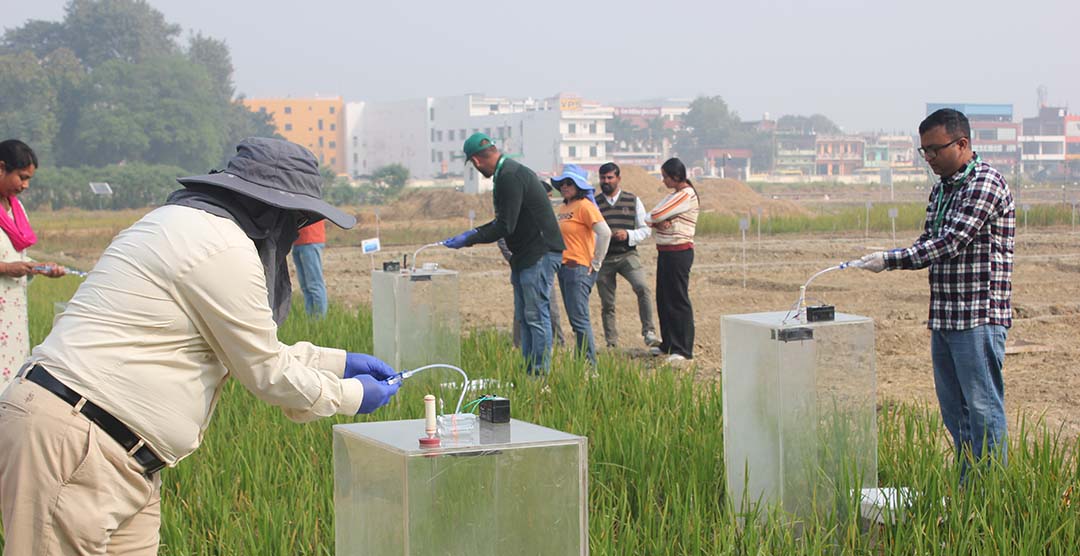
Throughout the week, participants engaged in field demonstrations, laboratory work, and data interpretation exercises designed to strengthen their capacity to support national climate goals. The program reinforces IRRI and ISARC’s commitment to advancing climate-smart agriculture through rigorous research, accurate measurement, and strong institutional partnerships.
Interested in similar training opportunities? Visit education.irri.org to learn more or email us at irri-education@cgiar.org.
ISARC Hosts Advanced Training on Soil Health Management in Rice-Based Cropping Systems
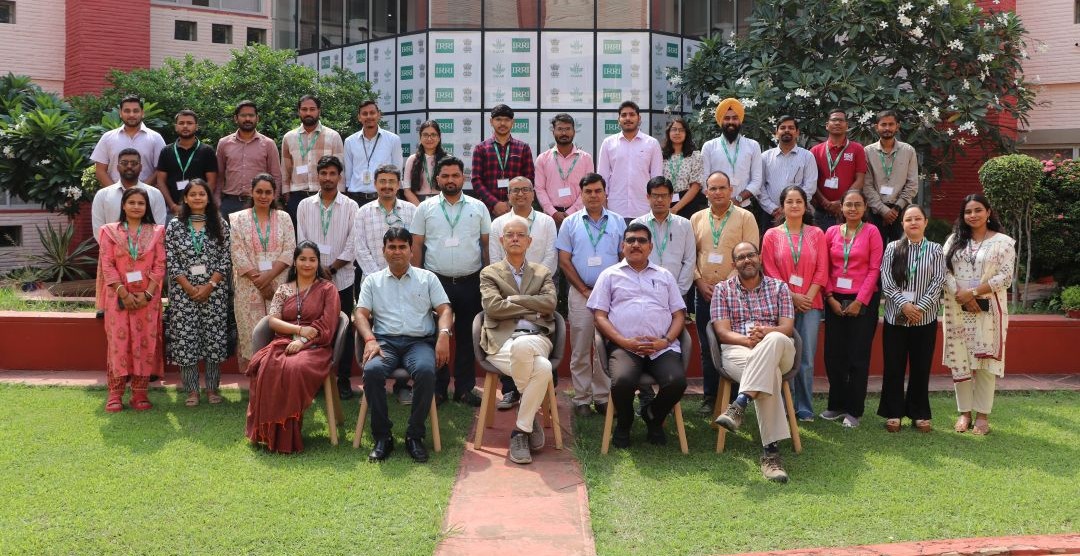
Varanasi, 20 September 2025: The International Rice Research Institute (IRRI), South Asia Regional Centre (ISARC), Varanasi, in collaboration with IRRI Education, has successfully concluded a four-day advanced training program from 17 September to 20 September 2025 on “Advanced Approaches to Soil Health Management in South Asia’s Rice-Based Cropping Systems.”
The program brought together participants from leading agricultural universities and ICAR institutes, including ICAR-IISS Bhopal, ICAR-IIFSR Modipuram, BHU-Varanasi, SHUATS Prayagraj, Punjab Agricultural University, and others. Renowned experts from BHU, ICAR-NBAIM, ICAR-IARI, IFDC, and ISARC contributed as resource persons.
Speaking at the inauguration, Dr. Sudhanshu Singh, Director of ISARC, remarked that soil is the foundation of our food systems. Through this program, IRRI is building regional expertise and preparing the next generation of professionals to safeguard soil health for sustainable food security.
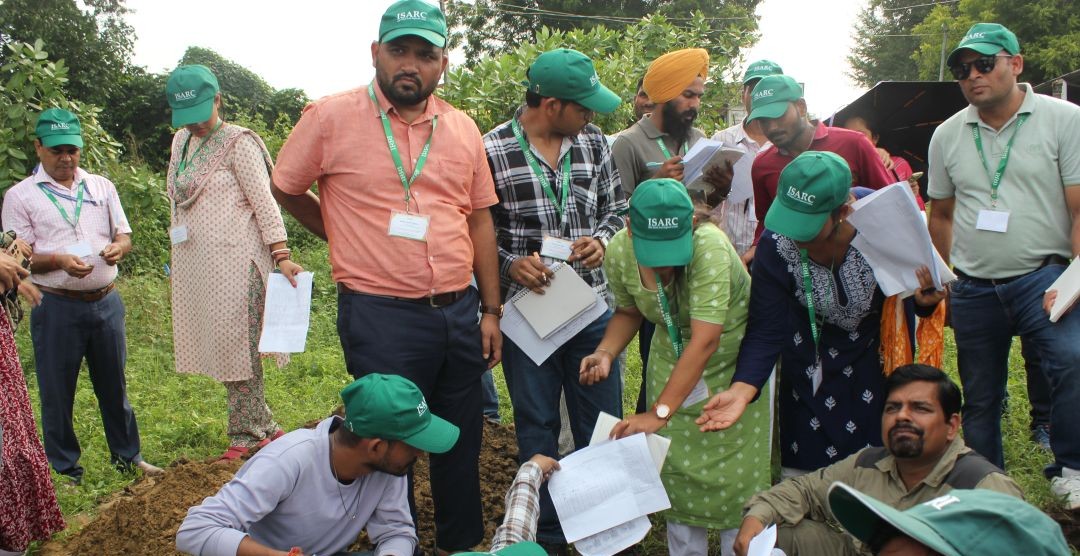
Unlike routine training courses, this program was designed as an in-depth, blended learning experience that combined lectures, hands-on activities, field visits, and laboratory demonstrations. Key sessions included digital tools for soil and crop management, where ISARC soil scientists Dr. Anthony Fulford and Dr. Ajay Mishra led sessions on the Rice Crop Manager (RCM), a farmer-friendly decision-support tool designed to optimize nutrient use efficiency and enhance productivity in rice-based systems.
Participants also explored the scope of soil spectroscopy for rapid and cost-effective soil analysis, with demonstrations at ISARC’s advanced laboratory highlighting its potential to support farmers with timely and precise soil health information and offering scalable solutions for better nutrient management.
A session on soil health governance and policy, delivered by Dr. Yashpal Sahrawat, Director-Resilience and Environment at the International Fertilizer Development Center (IFDC), USA, emphasized the importance of policy frameworks and governance mechanisms such as the Bharat Soil Health Policy, with a timeline of phased implementation by 2047. This session included discussions on institutional support for promoting sustainable soil health practices at both national and regional levels, and called for low-cost, incentivized soil health policy.
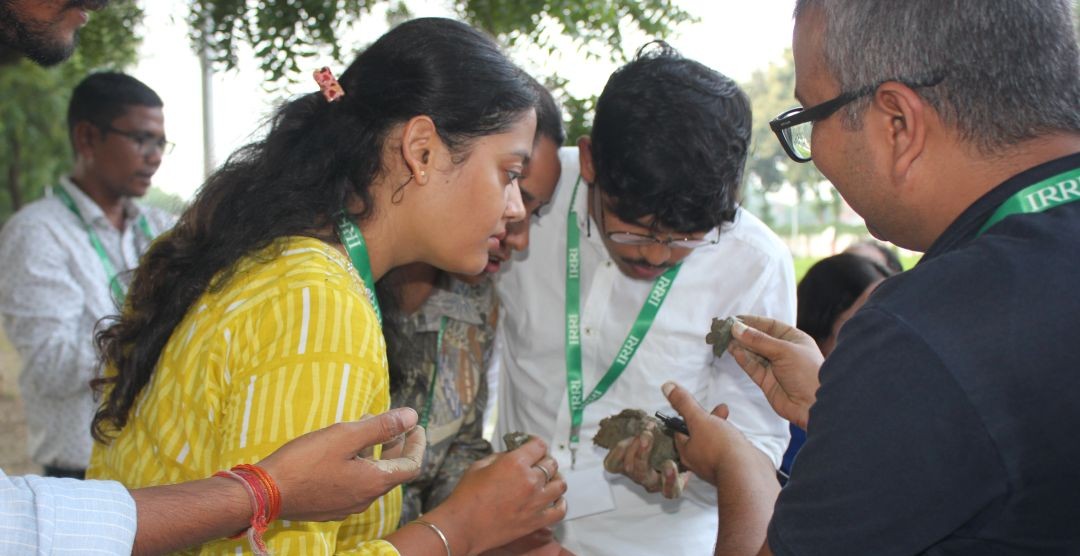
In addition to classroom sessions, participants engaged in exposure visits to progressive farmers’ fields in Varanasi, where they observed integrated soil and water management practices in real-world settings. They also worked with soil health kits and conducted lab-based analyses to strengthen their technical expertise.
By combining scientific insights, digital innovations, and policy perspectives, the training equipped soil scientists, agronomists, extension professionals, and faculty members with actionable knowledge and practical skills to advance climate-smart, farmer-centric soil health management strategies across South Asia.
Interested in similar training opportunities? Visit education.irri.org to learn more or email us at irri-education@cgiar.org.
Proving impact: IRRI equips professionals to achieve measurable results
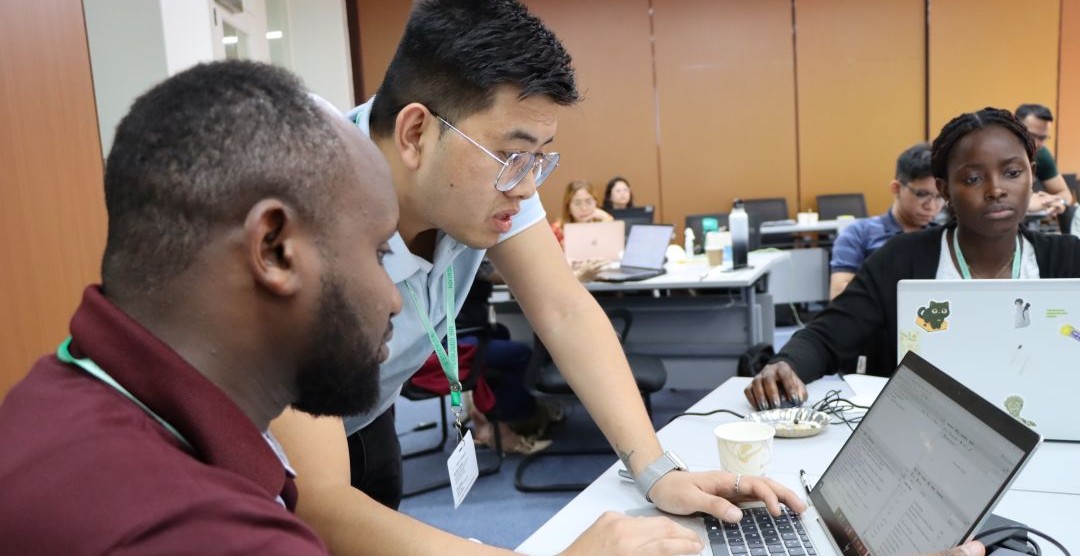
Los Baños, Laguna, Philippines (11 July 2025) — Measurable impacts are essential in policy and program development to achieve transparency and accountability. Impact evaluation plays a crucial role in determining whether a particular intervention has made a difference.
This was the core focus of IRRI’s Workshop on Impact Evaluation and Causal Inference held from 8 to 11 July 2025 in IRRI’s Headquarters. This four-day training equipped participants with tools to assess the effectiveness of interventions. Impact evaluation focuses not only on outcomes but also on attribution, whether the observed changes in target key indicators can be confidently linked to the intervention itself. This approach helps guide decisions on which programs should be scaled, redesigned, or discontinued. The course addressed a key challenge faced by development professionals: how to generate credible evidence about what works, why it works, and at what cost.
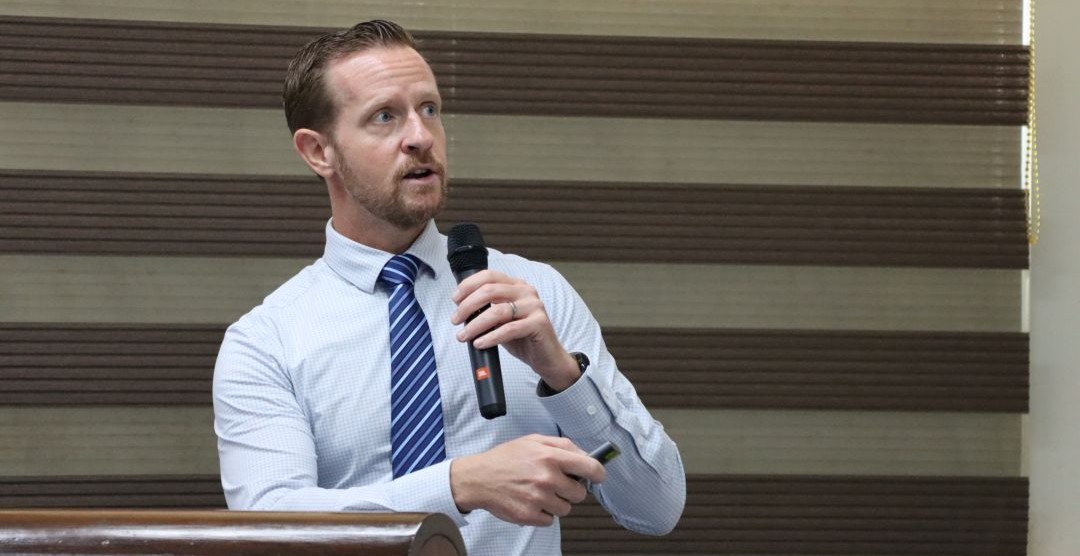
In her opening remarks, Dr. Anilyn Maningas, Head of IRRI Education, underscored the training’s relevance across sectors. She noted that in a complex and resource-constrained environment, it is more critical than ever to understand what works and why. “This workshop aims to equip you with the tools and frameworks necessary to answer these pressing questions using rigorous evaluation methods and causal inference techniques,” she said.
This call for evidence-based action was echoed by Dr. Patrick S. Ward, Associate Professor at the University of Florida. He explained that decision-makers often face several competing policy options, and that selecting a course of action should be based not on ideology or anecdote, but on strong and credible evidence. Grounding policies in well-designed impact evaluations, he added, is essential to making informed and effective choices.
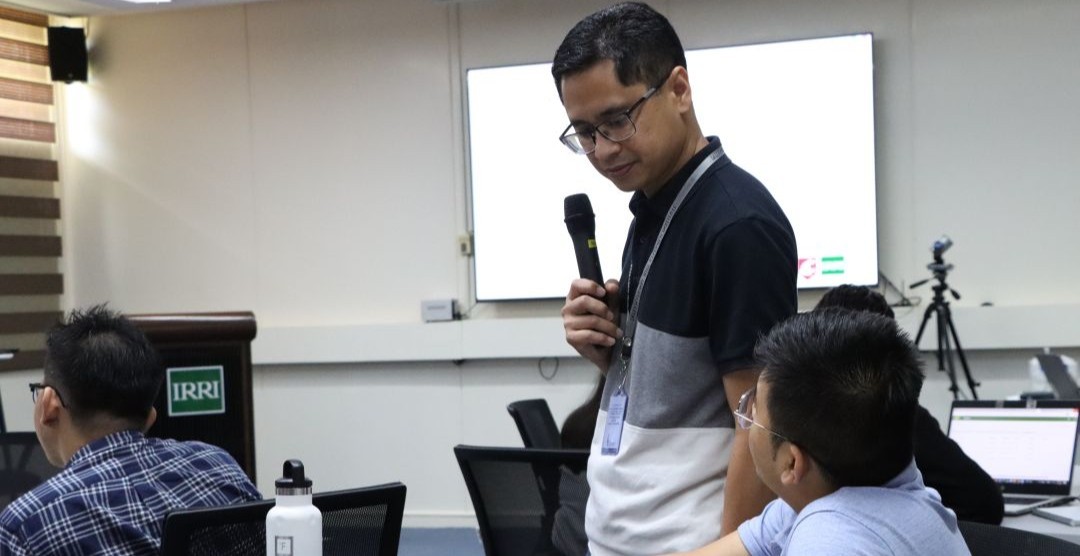
A key component of the training was the Theory of Change, a tool that helps map out how and why an intervention is expected to produce desired results. Participants learned how this framework can clarify assumptions, identify relevant indicators, and support the design of high-quality, policy-relevant evaluations.
Trainees were also introduced to designing, implementing, and analyzing randomized controlled trials, and quasi-experimental methods such as difference-in-differences (DiD), instrumental variables (IV), and regression discontinuity designs (RDD). These rigorous impact assessment methods help strengthen the credibility of evaluation findings by isolating causal effects.
Adding a practical lens, Dr. Gregmar Galinato, Professor at Washington State University, used case studies to demonstrate how to evaluate the suitability of various quasi-experimental methods.
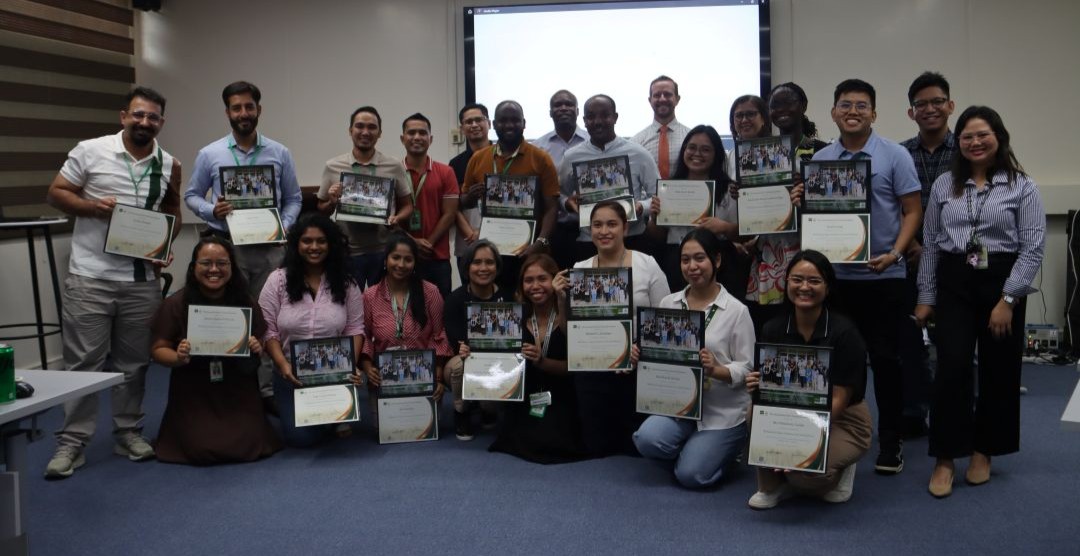
Meanwhile, Prof. Suzette Pedroso Galinato, Associate Professor and Extension Specialist at Washington State University Extension, emphasized the importance of evaluating interventions from the standpoint of those most affected: the farmers. She shared, “Economics is like a ribbon that ties the project together. Because after all the field activities, data collection, and information dissemination, the main concern of the growers is how the intervention affects their farm environment.” Therefore, understanding the tangible impact of interventions is key to designing meaningful and responsive programs. Prof. Galinato also discussed how to determine whether the intervention introduced to the target beneficiaries is more cost-effective than other alternatives by conducting cost-effectiveness and cost-benefit analyses.
The workshop serves as a timely and relevant initiative as IRRI introduced its 2025 to 2030 Strategy, which emphasizes measurable impact, evidence-informed action, and results that benefit farmers, communities, and food systems. Building on the success of this pilot run, the team plans to offer the course again next year to reach a broader group of professionals working to improve agricultural development outcomes.
Interested in similar training opportunities? Visit education.irri.org to learn more or email us at irri-education@cgiar.org.
RR2P 2025: Connecting Global Perspectives with Ground-Level Realities in Rice Science
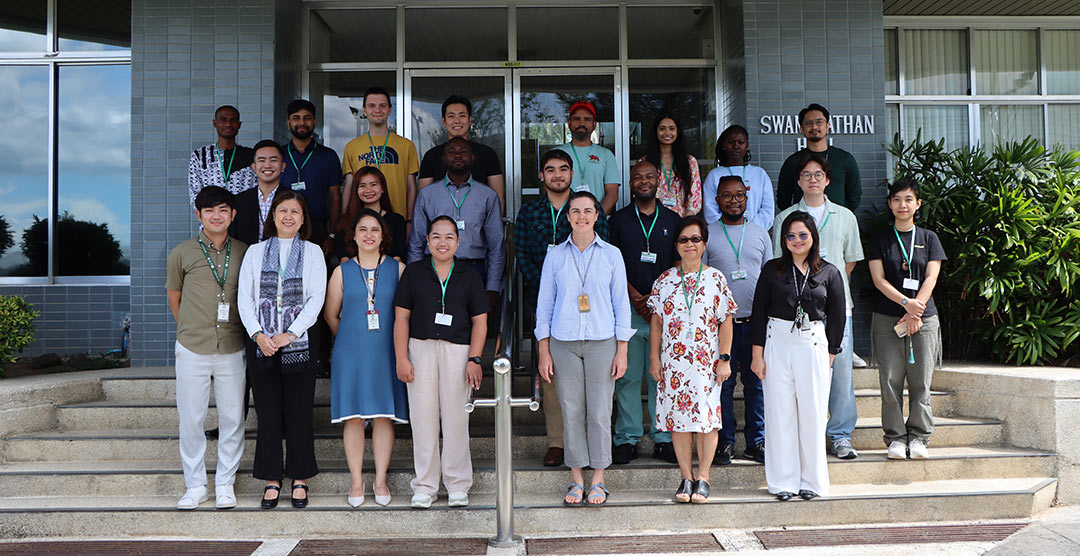
The Rice: Research to Production (RR2P) course returned in 2025 for its 18th run, reaffirming its commitment to immersive, hands-on learning that bridges the gap between science and practice. This year’s edition brought together a diverse cohort to study rice research and production at IRRI’s Headquarters. For three weeks, participants explored the entire rice value chain through lectures, laboratory and field activities, and community engagement.
Among the participants were Yvonne Njoki Ndaru from Kenya and Jongho Bae from South Korea. Sponsored by the IRRI-DANIDA project in Africa and the Global Rice Research Foundation (GRRF) respectively, both scholars entered the program with unique academic backgrounds and motivations. Yvonne is currently pursuing a PhD in Environmental Science at Chuka University, with her research centered on how watering regimes and crop establishment methods affect greenhouse gas emissions in rice fields. Jongho, a Master’s student in Agricultural Economics at Purdue University, focuses on the role of rice trade in national food security and its implications for global inequality.
Despite coming from different disciplines, both participants were connected by a shared desire to make agriculture more inclusive, resilient, and sustainable.
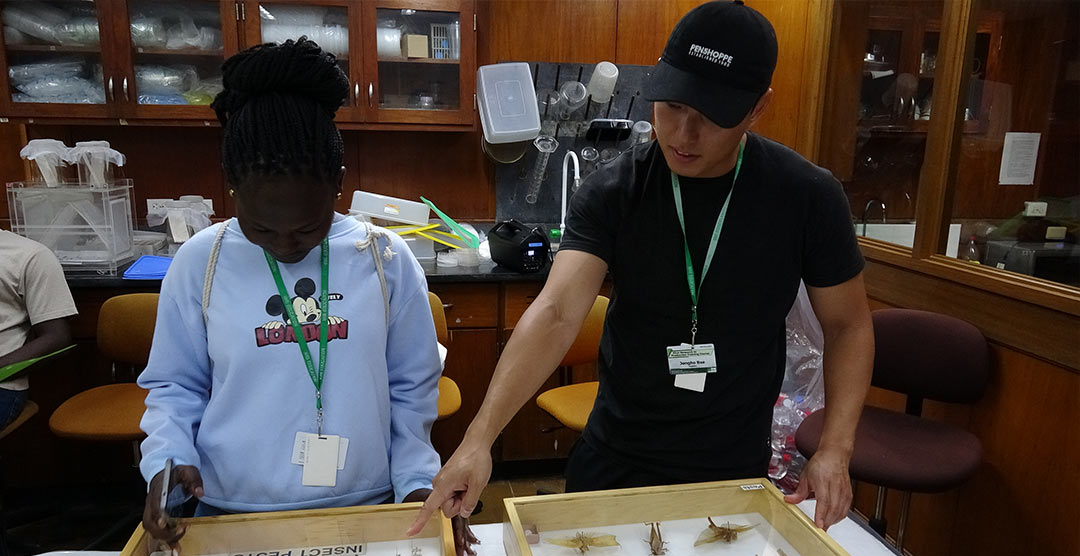
An Eye-Opening Start
For Jongho, joining RR2P was a step toward bridging the gap between theoretical knowledge and the day-to-day realities of farmers. “I wanted to better understand how agriculture actually works on the ground, and what challenges farmers face in their daily lives,” he said. As someone who had primarily studied agricultural trade and policy, RR2P offered an opportunity to explore the scientific and practical aspects of rice production that he had not previously encountered.
Yvonne, meanwhile, had long admired IRRI’s work and viewed the program as a vital step in her journey as a researcher. “The program’s emphasis on combining rigorous academic learning with real-world field experience immediately resonated with me,” she noted. At the start of the program, she felt a mix of excitement and nervousness, especially upon seeing participants from various countries and disciplines. “This diversity created an incredibly rich learning environment right from the start,” she added.
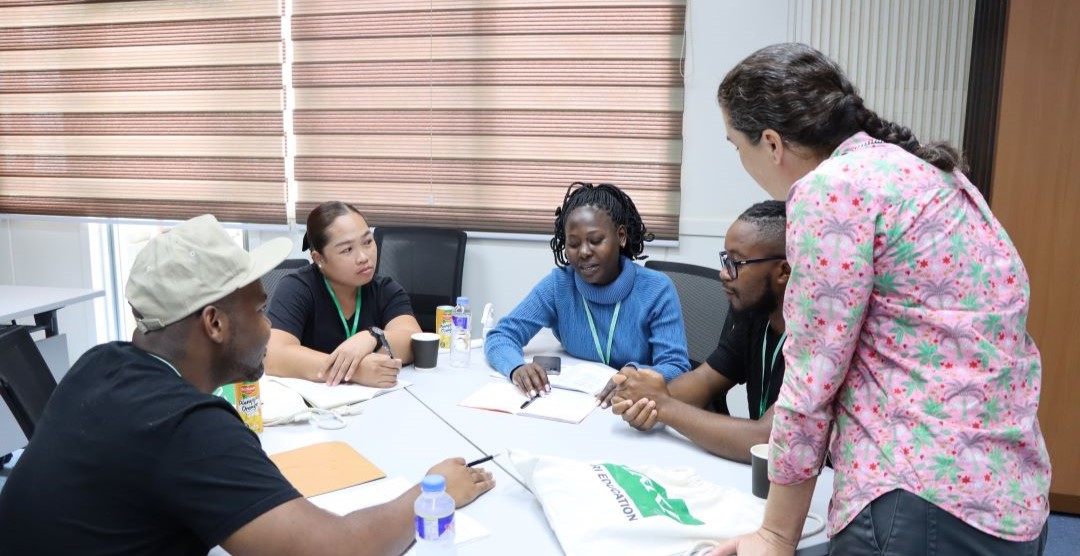
Learning by Doing
RR2P stands out for its strong emphasis on experiential learning. Participants were not just learning theories in a classroom; they were out in the field, engaging directly with the systems, practices, and people that define rice research and production.
Yvonne, whose work focuses on greenhouse gas emissions in rice fields, appreciated the depth and scope of the technical sessions. She found the hands-on disease and pest diagnostics particularly useful and was inspired by sessions on plant breeding. “Learning about breeding and Rapid Generation Advancement was especially meaningful. I had always admired plant breeders, and until this program, I had no experience in that area. However, by the end of RR2P, I felt empowered and well-versed in breeding practice,” she shared.
For Jongho, the course offered an in-depth look at the science behind the crop he had previously only studied through policy and trade data. The sessions on seed systems, soil management, and pest control were unfamiliar at first, but these sparked a strong interest. “These topics, though technical, were the building blocks of rice production, and I realized how essential they are to understanding the crop in its full complexity,” he said.
Both found that field visits brought technical knowledge to life. The combination of classroom and field-based learning helped them connect scientific insights with the on-the-ground experiences of farmers, a connection that will help continue shaping their work moving forward.
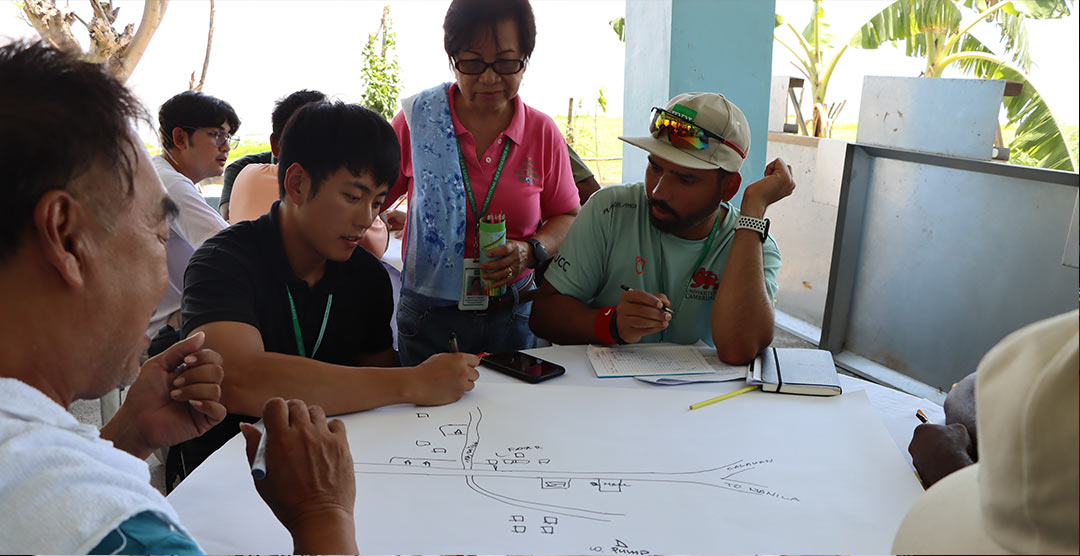
Ground-Level Realities
One of the most defining experiences for both Yvonne and Jongho was the visit to farming communities in Victoria, Laguna, and the Banaue Rice Terraces. For Jongho, a conversation with a local rice farmer in Victoria left an impact. “He had achieved a good harvest, but what he shared with me was far from encouraging,” Jongho recalled. “Despite producing quality rice, he explained that he often had to sell it at extremely low prices. The reason wasn’t poor demand or weather—it was a lack of access to post-harvest facilities like drying and milling. Without those, farmers are forced to sell immediately to middlemen, who take most of the profit.”
Further, that moment changed the way Jongho viewed his own field. “I saw that behind every trend or statistic are real people—whose livelihoods are often affected by infrastructure gaps and limited access to value chains. It was a clear and personal reminder that research must be grounded in the real challenges people face. That single exchange helped reframe the way I see the role of policy and economics—not as abstract forces, but as tools that can either exclude or empower.”
On the other hand, Yvonne described the rice planting activity in the IRRI experimental fields as a powerful turning point. “As we stepped into the muddy paddies, I felt an immediate connection with the farmers who perform this labor daily,” she reflected. Afterwards, she spoke with farmers in Victoria, Laguna and Banaue. “They shared their experiences, challenges, and hopes for better yields. Understanding their daily realities and linking them with the planting experience underscored the need for research that is not only scientifically sound but also adaptable to local contexts. It reminded me that innovation must be driven by farmers’ lived experiences, not abstract theories, if we truly want to achieve sustainable outcomes.”
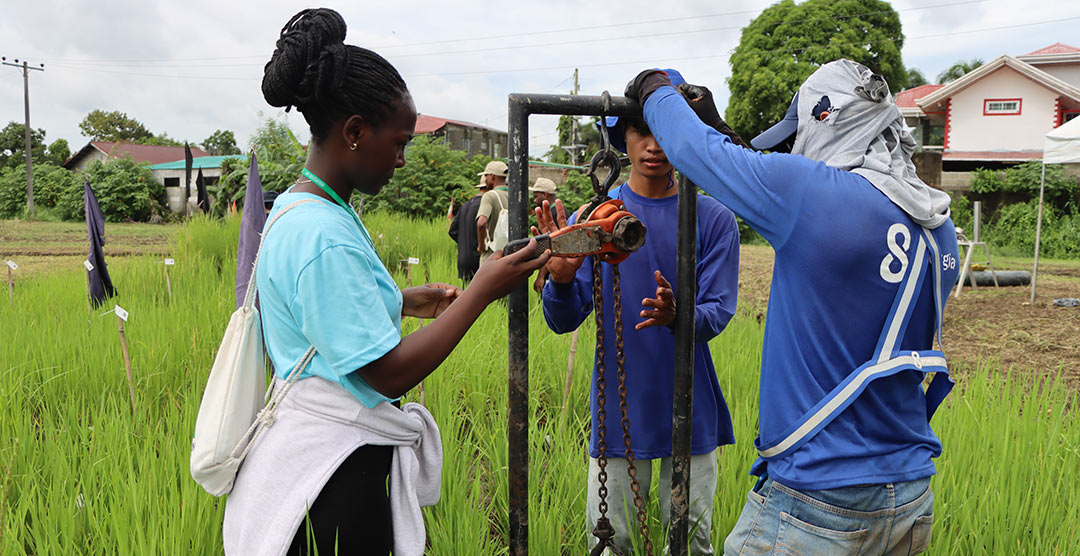
Cross-Disciplinary Collaboration
The diversity of the course’s cohort also led to dynamic exchanges of ideas. Yvonne recalled a group discussion where participants debated solutions to food insecurity and climate change. While some advocated for early-maturing rice varieties, others emphasized sustainable farming practices. The exchange, she said, revealed the potential of combining technical and environmental approaches to address complex problems.
Similarly, Jongho worked on a project focused on salinity in Vietnam. While his group members explored breeding salt-tolerant varieties, he emphasized the importance of ensuring that innovations translate into economic benefits for farmers. “Future agricultural solutions will require close collaboration between economists and scientists. Real progress depends on our ability to listen to one another, bridge perspectives, and work toward shared goals,” he said.
Growth Through Challenge
Both participants acknowledged the demanding pace and intensity of RR2P. Jongho initially struggled with the rural environment and unfamiliar routines. Yet over time, these challenges helped him grow. “I became more grounded in how I see my role as a researcher,” he shared.
Yvonne also found the schedule packed, but she faced the challenge with resilience and curiosity. “Whenever I encountered a concept, I couldn’t immediately grasp, I made it a point to delve deeper through additional research,” she said. The supportive community of peers and mentors made the learning process both rigorous and rewarding.
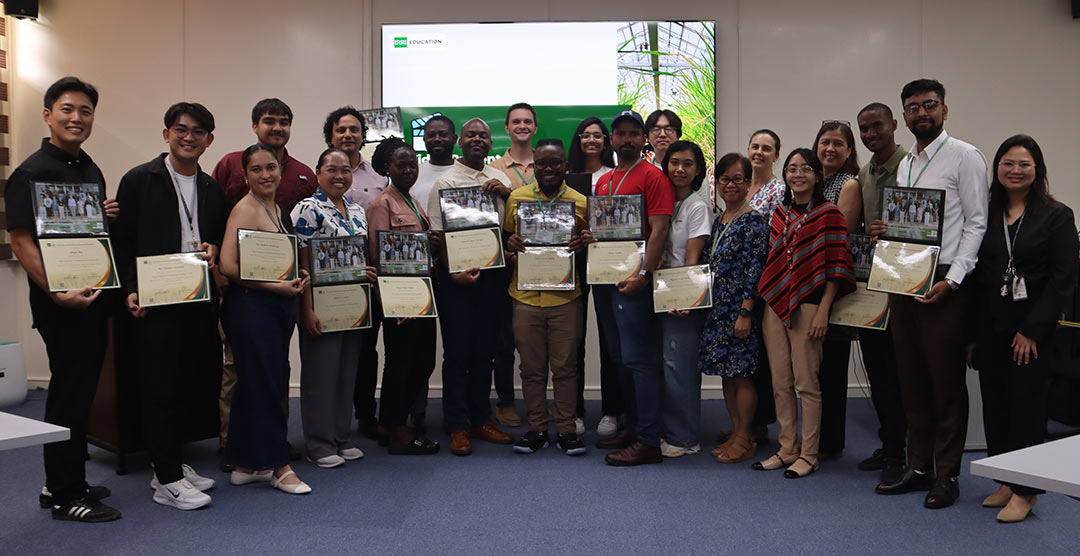
Looking Ahead
As they return to their home institutions, Yvonne and Jongho carry forward not only new knowledge but also a renewed sense of purpose. Yvonne plans to collaborate with researchers and farmers in Kenya to develop context-specific, sustainable practices. Jongho, on the other hand, intends to integrate the lessons from RR2P into his work on agricultural policy and trade, ensuring that his research remains grounded in the real challenges that communities face.
Their stories reflect the spirit of RR2P, a program that brings together aspiring changemakers and empowers them to influence a more inclusive, resilient, and sustainable future for the rice-based agri-food sector.
Through the continued support of partners like the IRRI-Danish International Development Agency (DANIDA) project and the Global Rice Research Foundation (GRRF), programs like RR2P remain accessible to the next generation of leaders in rice science. While the 2025 edition may have concluded, its lessons will continue to shape the personal and professional journeys of those who took part.
As Yvonne shared, “RR2P is a journey of discovery, collaboration, and impact, where science meets practice to shape the future of rice research and sustainable farming.”
While Jongho and Yvonne’s reflections offer a glimpse into the impact of the course, they were just two of many. The 2025 RR2P cohort included professionals with backgrounds ranging from agronomy and plant breeding to agricultural economics and development. Coming from institutions such as the University of California Davis, Yunnan Agricultural University, Purdue University, Chuka University, Vietnam Academy of Science and Technology, National Institute for Agrarian and Veterinary Research (INIAV) in Portugal, and the International Maize and Wheat Improvement Center (CIMMYT), the group brought together a rich mix of experiences that enabled interactive discussions, cross-cultural exchanges, and shared learning, connections that they are now carrying into their own work.
Interested in joining this journey? Be part of the next RR2P cohort and gain the knowledge, skills, and perspective needed to make meaningful contributions to global rice systems. The program also welcomes support for participants who may need assistance to take part. Visit education.irri.org to learn more or email us at irri-education@cgiar.org.
RDA-IRRI champions climate-smart pest management for sustainable rice production
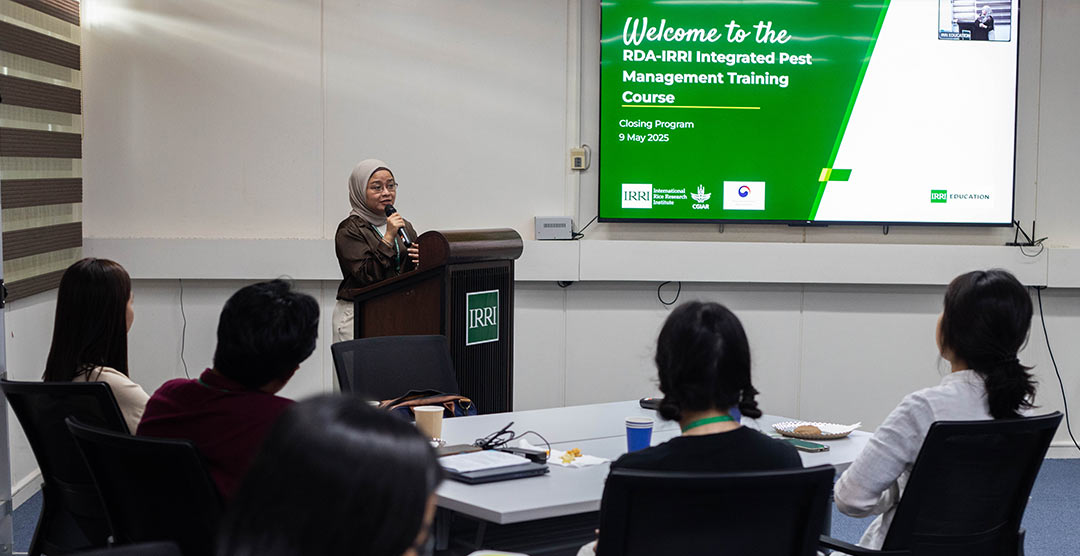
LAGUNA, Philippines (13 May 2025) — IRRI emphasizes prevention and suppression at the recent International Technology Cooperation Center of the Rural Development Administration – Korea (ITCC- RDA) and IRRI training on Integrated Pest Management (IPM). The 5-day training course aimed to introduce recent paradigm shifts in rice pest management, update participants on recent advances in management technologies, and assist them in the preparation and implementation of their localized IPM research plans.
Integrated Pest Management (IPM) is a sustainable and effective management approach to controlling pests in agriculture by implementing a combination of scientific techniques and ecological knowledge such as pest biology and behavior. IPM was first introduced in the 1970’s to address the growing negative effects of pesticides in agriculture. “Rice will have to be produced, processed, and marketed in a more sustainable way.”, IRRI Scientist and Country Representative for Cambodia Dr. Nurmi Pangesti said as she explained how climate change is shaping ecosystems involved in global rice production.
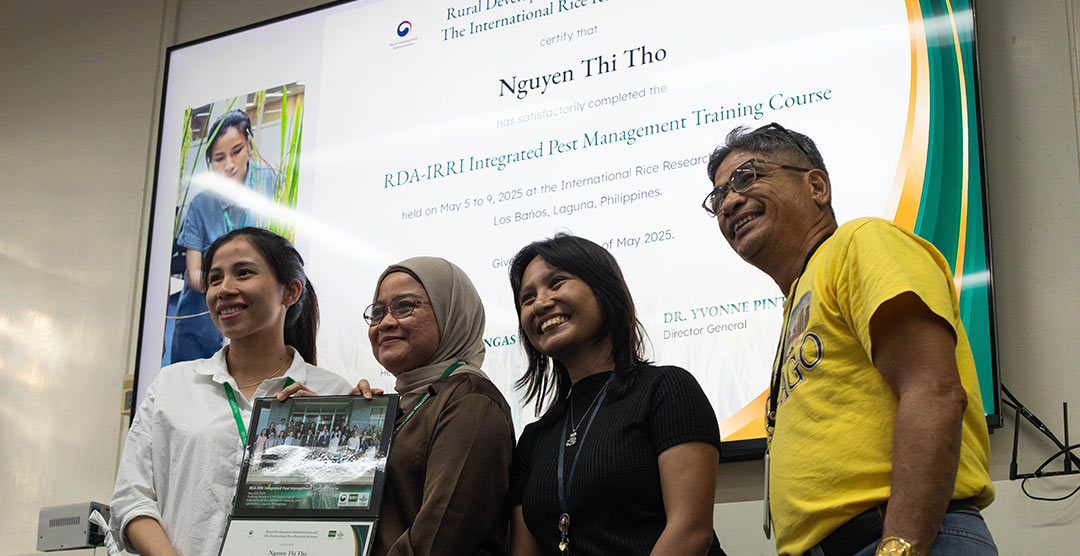
IPM does not aim to eliminate all pests present in the field. Rather, its goal is to control the pest population by ensuring that a single species is not dominating the ecosystem and causing significant damage to the crops. A major principle that Dr. Nurmi highlighted is that IPM emphasizes prevention and suppression of pest population before intervening through the application of chemical pesticides. IPM deprioritizes the use of chemical pesticides since they contribute to climate change. Moreover, there is a declining number of approved active substances which increases the risk of resistance development.
IRRI Senior Associate Scientist Dr. Nancy Castilla stated that climate change significantly influences the population of pests and the intensity of diseases and pest injury . “Rice yields decline by 10% for every 1-degree Celsius increase in minimum temperature.”, Dr. Castilla explained. “There is an increasing number of studies which show that the increase in crop losses to insect pests is caused by an increase in temperature by the warming climate.”
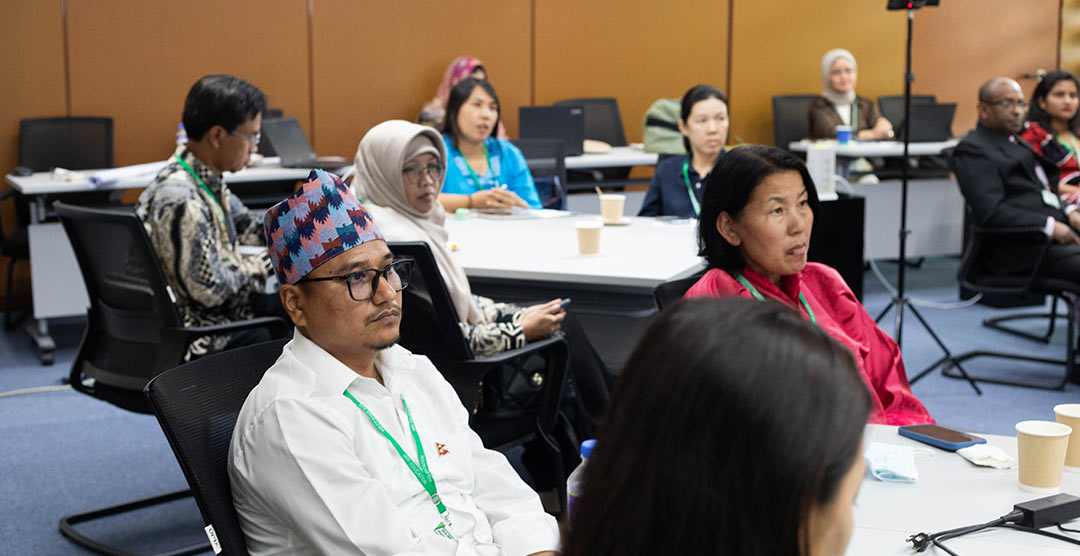
To help smallholder farmers adapt to climate change, IRRI is promoting climate-smart pest management (CSPM) which takes into consideration both integrated pest management techniques and climate change adaptation and mitigation practices. CSPM aims to reduce crop losses caused by pests, increase incomes of those farmers who practice sustainable farming, and improve overall environmental resilience.
Senior Agriculturist Russ-Uzi Mayenne A. Ebora from the Philippines Bureau of Plant and Industry (BPI) shared how the country is scaling CSPM at the community-level. She stated that they are promoting the use of biological control agents (BCAs) like Trichogramma to control the population of the destructive Yellow Stem Borers (YSB) in rice. There is a need for strong policy and investment support for scaling IPM to ensure stable supplies of BCAs for smallholder farmers.
CHECK OUT the IRRI Education website for more training and scholarship opportunities.
IRRI pioneers modern crop breeding strategy, trains researchers on One IRRI Rice Breeding Strategy and hybrid rice breeding
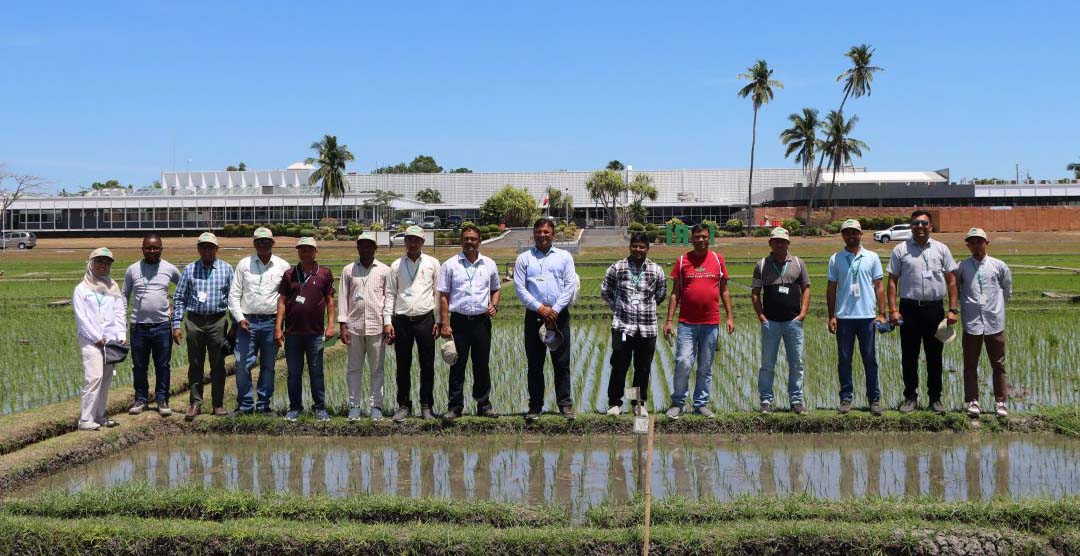
LOS BAÑOS, Philippines (05 May 2025) — The International Rice Research Institute (IRRI), through IRRI Education, successfully concluded its Recent Advances in Hybrid Rice Breeding Training Course, which was held from 24 April to 5 May 2025 at IRRI’s headquarters in Los Baños, Laguna, Philippines. The 12-day course gathered researchers from across the globe to enhance their skills in hybrid rice breeding and contribute to the broader global food security goals.
Dr. Anilyn Maningas, Head of IRRI Education, underscored the urgency of the institute’s mission on tackling food security by transforming rice-based agri-food systems, “With global rice production needing a drastic increase despite decreasing resources such as land, water, and labor, our mission is more urgent than ever. Take full advantage of this opportunity not only to deepen your technical skills but also to build a network of peers and mentors who are equally passionate about hybrid rice breeding.”
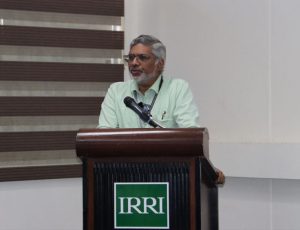 The participants were introduced to the One IRRI Rice Breeding Strategy and its role in global rice breeding. Compared to traditional, fragmented breeding efforts, this strategy aims to unify efforts by setting standards and efficient resource management among local and international partners. Basically, this will speed up the breeding process of nutritious and market-preferred rice varieties which are also climate-resilient. This crop breeding strategy can also be replicated in similar crops. Dr. Jauhar Ali, Principal Scientist and Hybrid Rice Breeder at IRRI, served as one of the lead instructors. “How do we produce more from less? This is the challenge we face,” he said. “We need to increase production while reducing inputs like fertilizers and pesticides.” Dr. Ali emphasized the potential of hybrid rice to improve resource use efficiency and equip researchers to address global food security challenges more sustainably. Hybrid rice is a type of rice which is produced from two genetically different parents which commonly result in higher yielding varieties.
The participants were introduced to the One IRRI Rice Breeding Strategy and its role in global rice breeding. Compared to traditional, fragmented breeding efforts, this strategy aims to unify efforts by setting standards and efficient resource management among local and international partners. Basically, this will speed up the breeding process of nutritious and market-preferred rice varieties which are also climate-resilient. This crop breeding strategy can also be replicated in similar crops. Dr. Jauhar Ali, Principal Scientist and Hybrid Rice Breeder at IRRI, served as one of the lead instructors. “How do we produce more from less? This is the challenge we face,” he said. “We need to increase production while reducing inputs like fertilizers and pesticides.” Dr. Ali emphasized the potential of hybrid rice to improve resource use efficiency and equip researchers to address global food security challenges more sustainably. Hybrid rice is a type of rice which is produced from two genetically different parents which commonly result in higher yielding varieties.
Complementing this perspective, Dr. Waseem Hussain, Senior Scientist for Plant Breeding at IRRI, highlighted the role of innovation in modern rice breeding. “This course offers a comprehensive platform to understand the complete hybrid rice pipeline, from selecting parental lines to using genomic tools and digital technologies,” he said. “It’s essential that researchers see how these innovations are applied in real field conditions.”
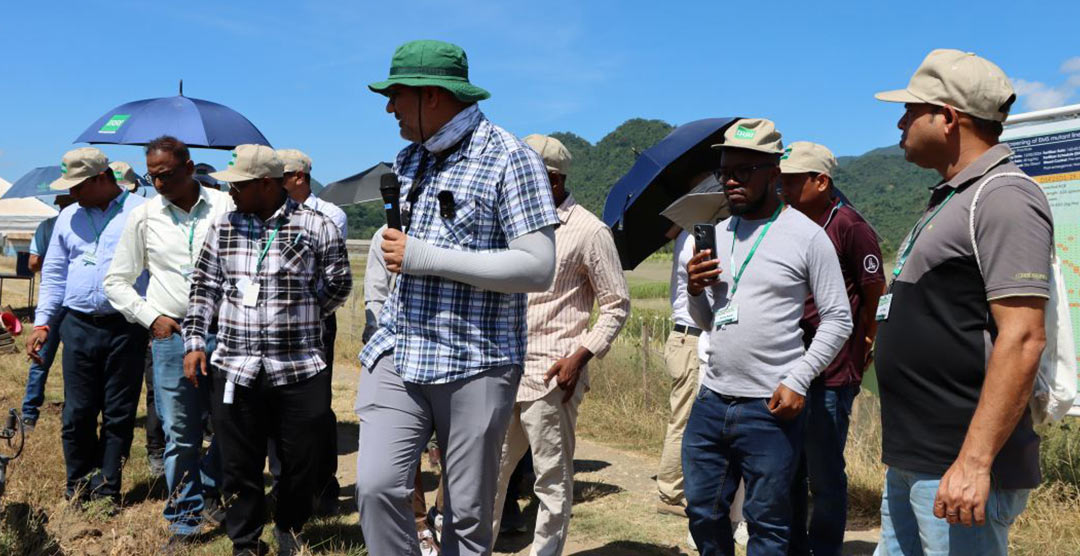
Designed to offer a holistic learning experience, the training combined classroom lectures, hands-on laboratory sessions, and field activities. Participants engaged with a wide range of topics, including genomic selection, rice hybridization, and the application of advanced tools such as drone phenotyping and artificial intelligence in agriculture.
Throughout the course, participants interacted directly with IRRI scientists and accessed the institute’s world-class research facilities. Field activities allowed them to observe hybrid rice cultivation firsthand and apply new techniques in real-world settings.
The training concluded with positive feedback from participants, who praised the course’s high-quality instruction and the opportunity to engage directly with IRRI’s scientists and the research environment. Many shared that the training provided valuable knowledge they could apply immediately in their respective research institutions.
Looking ahead, IRRI aims to offer the Hybrid Rice Breeding Training Course again in 2026, continuing its commitment to supporting research and innovation in hybrid rice development.
Interested in designing a course for your organization? Email us at education@irri.org
Uzbekistan Researchers Complete Hands-On Training on Hybrid Rice at IRRI

Two researchers from the Rice Research Institute of Uzbekistan completed a 3.5-month on-the-job training program on hybrid rice technology at the International Rice Research Institute (IRRI) headquarters in Los Baños, Philippines. The training, held from August 25 to December 7, 2024, aimed to build technical expertise in hybrid rice breeding, seed production, and cultivation to support Uzbekistan’s agricultural modernization and climate resilience goals.
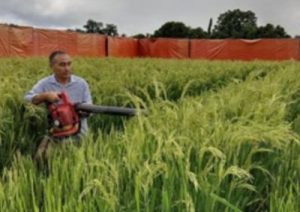 Facilitated by IRRI Education in collaboration with the Rice Breeding Innovation Department, the training was designed to provide an in-depth, hands-on experience. The first month focused on hybrid rice breeding, including floral biology, hybridization techniques, and field visits. Sessions on seed production practices such as transplanting of A, B, and R lines, GA₃ application, and pollination methods, followed this. From October to December 2024, the researchers concentrated on hybrid rice cultivation and were exposed to performance trials, socio-economic impacts, and improved cultivation strategies.
Facilitated by IRRI Education in collaboration with the Rice Breeding Innovation Department, the training was designed to provide an in-depth, hands-on experience. The first month focused on hybrid rice breeding, including floral biology, hybridization techniques, and field visits. Sessions on seed production practices such as transplanting of A, B, and R lines, GA₃ application, and pollination methods, followed this. From October to December 2024, the researchers concentrated on hybrid rice cultivation and were exposed to performance trials, socio-economic impacts, and improved cultivation strategies.
The program included full logistical support, from airport transfers and accommodation at IRRI Residences to visa assistance and insurance coverage, ensuring a seamless learning experience. A structured orientation, regular monitoring, and a post-training evaluation rounded out the training journey.
This activity forms part of IRRI’s ongoing commitment to strengthening the capacity of partner countries and advancing science-based solutions for sustainable rice production. (Click this link to learn more about the program)
Interested in designing a course for your organization? Email us at education@irri.org
KOICA-UPLB-IRRI partners for agricultural excellence, trains young PH researchers in bioinformatics
In a strategic effort to enhance the Philippines’ agricultural competitiveness, the Korea International Cooperation Agency (KOICA), in partnership with the University of the Philippines Los Baños (UPLB) and the International Rice Research Institute (IRRI), has successfully concluded two key internship training programs in 2024: the Basic Bioinformatics Course and the Basic Digital Phenotyping Course. These courses aim to equip Filipino university students and early-career professionals with the knowledge and skills in critical fields such as bioinformatics, genomics, molecular physiology, and biotechnology, empowering the next generation of researchers to drive agricultural innovation in the country.
Bioinformatics, the computational center of biology, can be used in rice research to identify genes of favorable agronomic traits such as increased yield or high nutrition which can then be introduced to rice varieties that do not carry them. It can also help predict phenotypic results, speeding up experiments that usually take years to develop. The partnership is also in the process of constructing the UPLB Genome Agricultural Research Center, which will be the home of genome and omics studies in the country.

The three-month internship program facilitated by the Bioinformatics team, in collaboration with IRRI Education, provides foundational knowledge of bioinformatics. Specifically, interns were trained to use the Linux Operating System to manipulate and analyze data on genomics-related information. The internship program aims to prepare the upcoming crop of Filipino researchers who will either conduct their projects in AGRC or be employed as AGRC research staff.
This marked the second phase of the two internship training programs. The first phase of the Basic Bioinformatics Course and Basic Digital Phenotyping Course was successfully conducted in 2022, laying a strong foundation for advancing knowledge in these fields. Building on the lessons and outcomes, the second phase in 2024 integrated significant enhancements, including utilizing a digital learning platform to deliver the courses effectively and expand their reach.

It has provided participants with practical, real-world experience in bioinformatics and digital phenotyping. Although the initial hybrid cohort has now completed the training, the program continues, with additional cohorts set to finish their courses through 2025. The program initially targeted 120 interns, but with 137 current participants, it has far exceeded expectations, further expanding the pool of skilled researchers in these critical fields.
Participants have developed essential skills in bioinformatics tools and data analysis techniques, all critical for advancing agricultural research. Reflecting on the participants’ achievements, Dr. Kenneth McNally, International Consultant at IRRI, stated, “We hope that our participants gained sufficient experience from this training course to be confident running different types of analysis and to apply other tools in their future work.”
Through this ongoing collaboration, the KOICA-UPLB-IRRI partnership is advancing academic and professional growth and contributing significantly to the Philippines’ agricultural research ecosystem. By equipping young Filipino researchers with the tools and experience needed to succeed, this partnership is helping shape the future of agricultural competitiveness, ensuring that the Philippines remains at the forefront of agricultural innovation and sustainability.
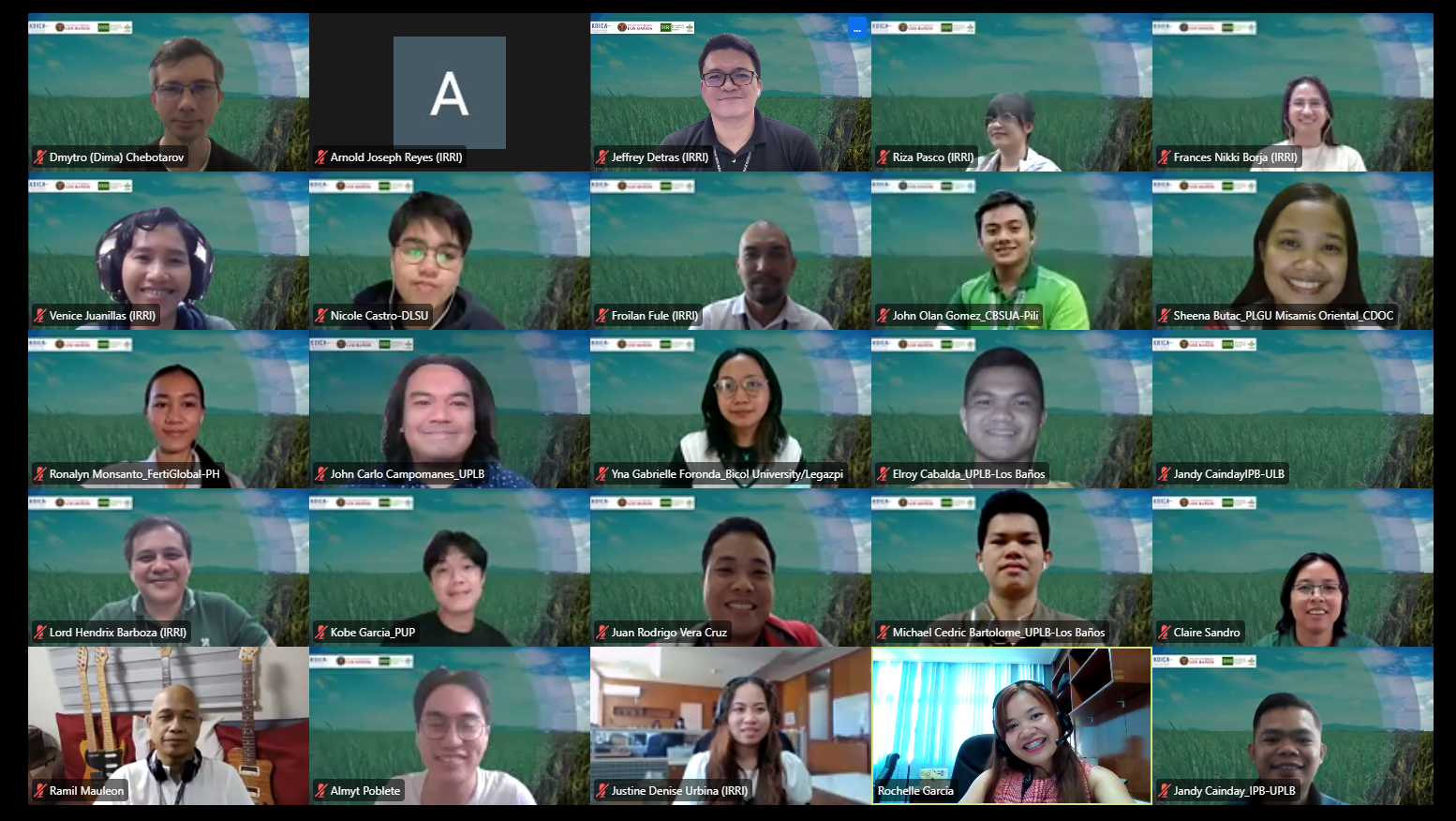
Interested in designing a similar course for your organization? Email us at education@irri.org
IRRI Education trains scientists in measuring and monitoring GHGs for mitigation
Los Baños, Laguna, Philippines — November 29, 2024 Rice production is a significant source of a greenhouse gas (GHG) called methane (CH4), accounting for up to 20% of national GHG inventories. Given the urgent need for climate action, mitigating GHG emissions from rice farming has become a critical global policy objective. Accurate measurement of emissions is essential for developing effective mitigation strategies, tracking progress, and ensuring that global climate targets are met.
Hosted at IRRI’s headquarters in Los Baños, IRRI Education conducted a “GHG Emissions in Rice Systems: Basics of Mechanisms and Standards for Measurement” course last November 29, 2024, which brought together 30 participants from India, Japan, Pakistan, Bangladesh, Cambodia, Benin, and the Philippines. The course aimed to enhance expertise in measuring greenhouse gas emissions from rice-based systems and explore effective mitigation strategies.
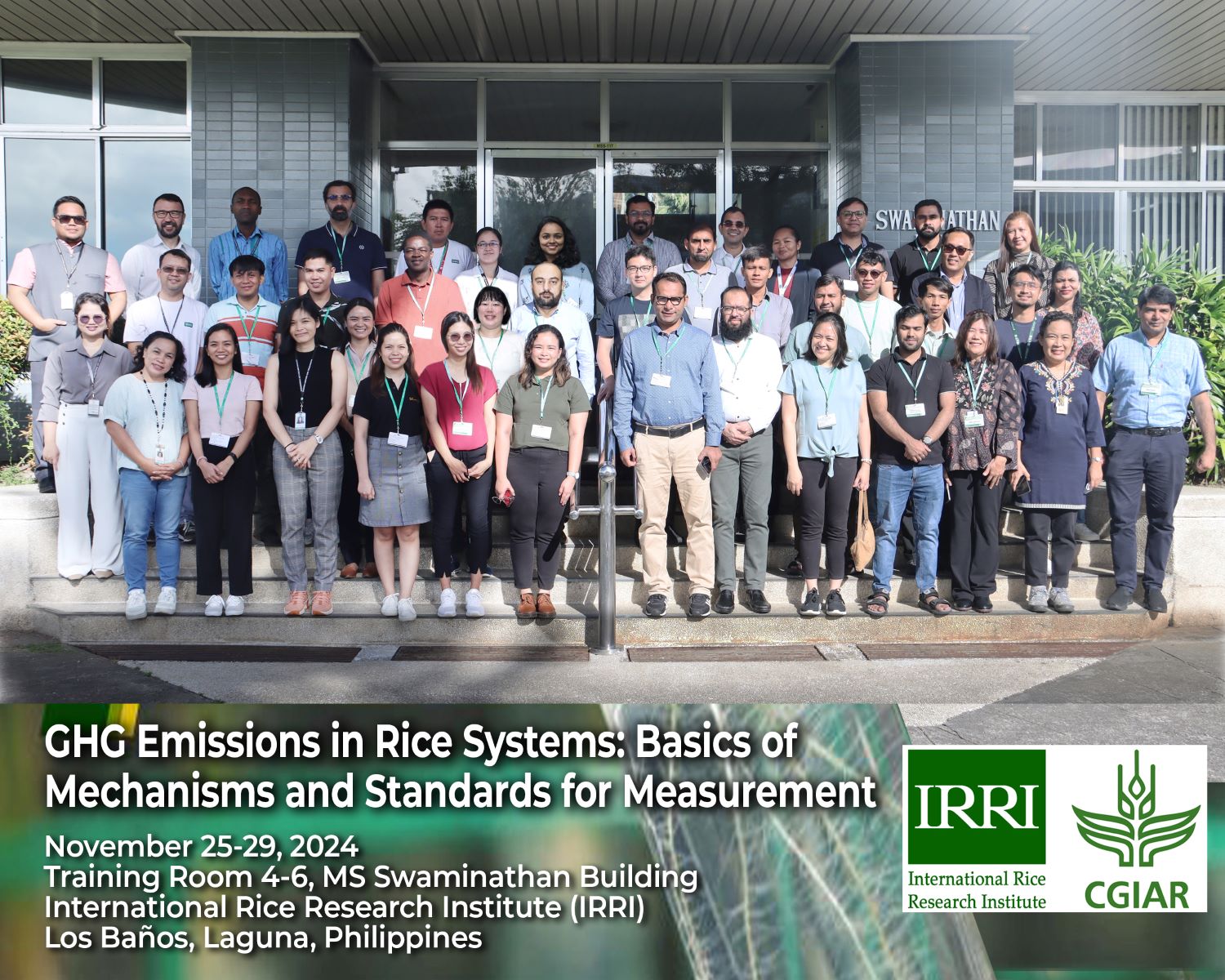
“Methane is 28 times more potent than carbon dioxide (CO2)”, said IRRI Senior Associate Scientist Olivyn Angeles, “Currently, it is at 1908.61 parts per billion (ppb) which, compared to the pre-industrial levels of 600-700, is very huge [increase] already.”, she continued.
In rice systems, a field may produce more greenhouse gas than when a person drives a car. IRRI Senior Scientist Ando Radanielson explains that on average, a rice field in the Philippines produces 1.46 kg of methane per hectare during the dry season. This emission is approximately equivalent to the carbon dioxide produced when a person drives a car for about 31,500 km.
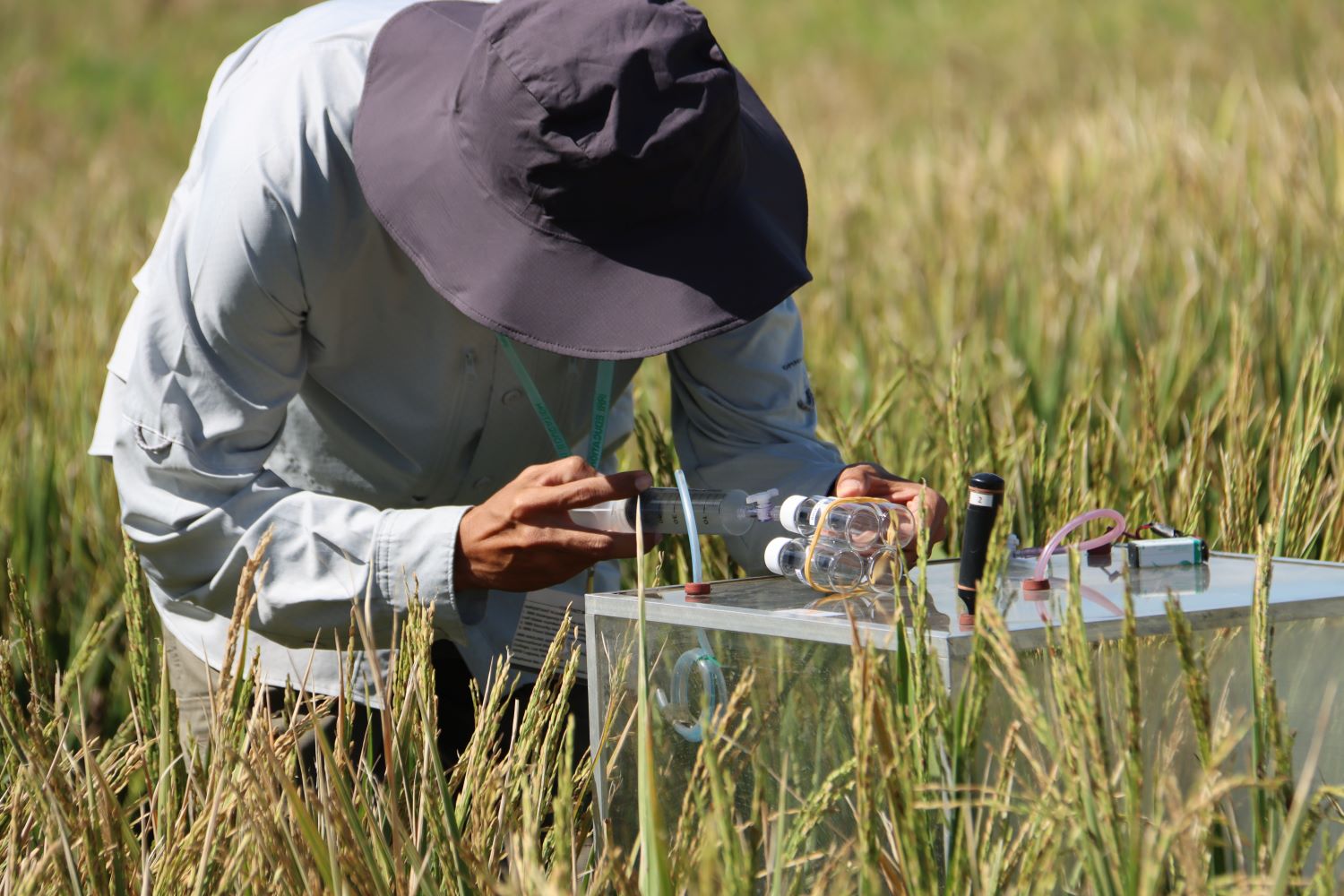
IRRI Interim Head of Sustainable Impact through Rice-based Systems (SIRS), Dr. Virender Kumar, emphasized the urgency of addressing climate change. “To mitigate its worst effects, we must limit global warming to below 1.5°C.” To achieve this, sustainable rice farming practices need to be adopted on a wider scale.

In addition to GHG measurement techniques, participants learned about mitigation practices like Alternate Wetting and Drying (AWD), which can significantly reduce methane emissions. Through AWD, fields are periodically drained and re-flooded, reducing irrigation costs. This method has effectively mitigated GHG emissions in rice production up to 30-70% with no reduction in yield. This is because when the field is drained and dried, the growth of methane-producing bacteria is inhibited resulting in a reduction in GHG emission.
The course also highlighted the importance of standardized emissions data for policy development and climate finance initiatives. Through capacity-building initiatives like this, IRRI aims to promote climate change mitigation through sustainable rice production. The training will be offered again in 2025, further strengthening efforts to tackle GHG emissions in rice farming.
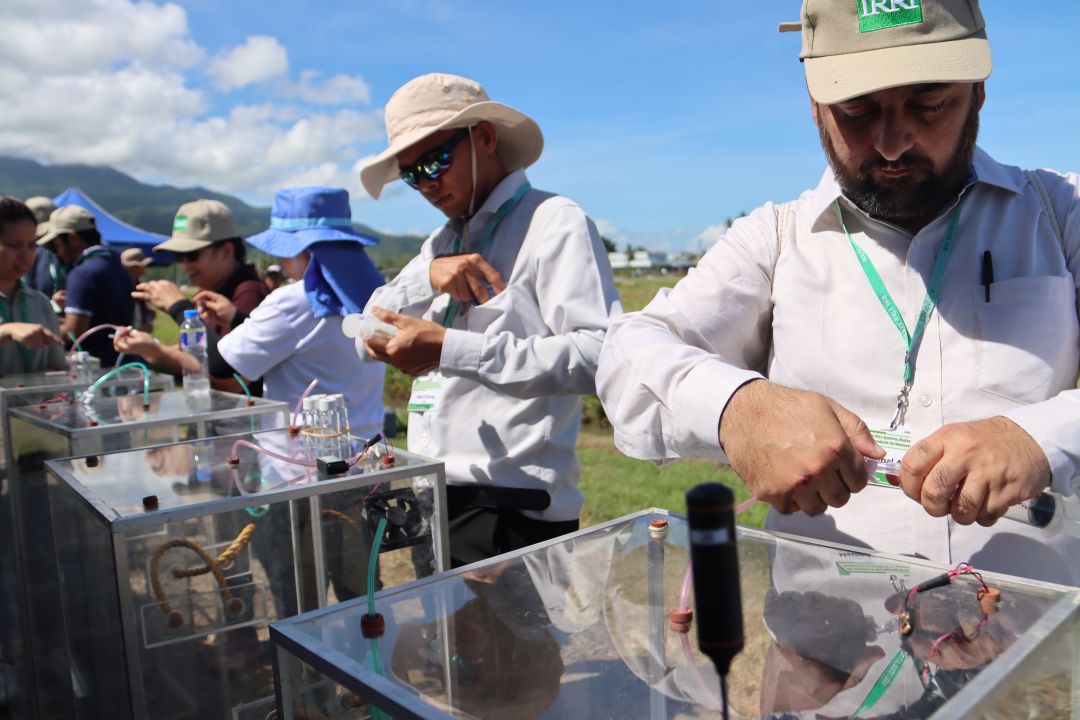
Interested in designing a similar course for your organization? Email us at education@irri.org

